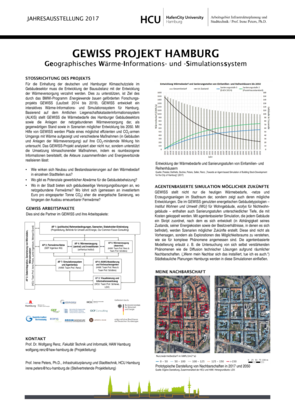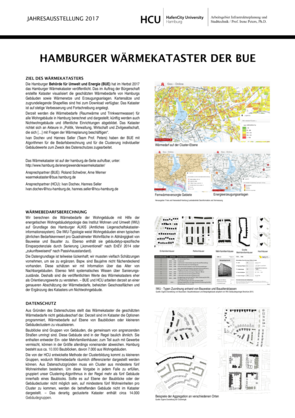Forschung | Research Grants
GEWISS (2014-2020)
GEWISS - GEographisches WärmeInformations- und SimulationsSystem (Geographical Information and Simulation System for Urban Heat Flows) is a research project within the EnEff:Stadt (EnEff:City) programme funded by the German Federal ministry for Economy and Energy (BMWi). (http://www.eneff-stadt.info/en/) . The funding has started in 2014, completion is planned for 2019.
Partners in the GEWISS project are Hamburg University of Applied Sciences (lead partner) (HAW); HafenCity University Hamburg (HCU); the Hamburg state department of Enviroment and Energy (BUE); various industry partners, like GEF district heat engineers and Ecofys consultancy; the Hamburg state office of Land Surveying and Geoinformation (LGV).
The aim of the GEWISS project is to provide an interactive information tool on the spatial distribution of heat demand and supply in Hamburg, as it is today and could develop over time – a dynamic heat map, in short.Why is this needed? Space heating is Germany’s second largest CO2 emitter. As the German building stock renews itself at only around 1% new construction every year, retrofitting the existing stock is one of the high-leverage options for reducing CO2 emissions.
To exploit the heating sector’s potential of carbon emissions reduction, the entire heating system – sources and sinks (individual buildings and heat supply) have to be developed incoordinated fashion. Focussing energy efficiency measures on individual buildings, retrofitting them to very high efficiency, easily turns outsuboptimal in a system perspective. Buildings in the neighborhood of a heating grid might be supplied by that grid, with retrofitting resources better spent elsewhere. Also, where old buildings and new construction meet, new small heating grids (based on cogeneration, renewables, waste heat) can be an attractive option. Moreover, the heat sector will increasingly need to serve as storage for renewable power. Thus, to improve the efficiency of the heating sector, an integrative system perspective on heat demand and supply has to be adopted – moreover, with attention to their spatial constellation.
For grid-based heating solutions to be realized, different actors have to be informed and coordinated: Individual building owners, city planning, energy providers. That is why heat maps have become an important tool in German municipal energy planning. German municipalities have electronic cadastres of their building stocks. Combined with building typologies that capture physical building properties relevant for heat transport, these cadastres can be turned into heat maps.
Hamburg already has a first-cut heat map of its residential building sector, based on the Hamburg cadastre, plus a building typology, combined with statistical sampling to support the allocation of building types to elements in the cadastre. The GEWISS project aims to build on this work and
- construct a detailed map of Hamburg’s heat demand and supply facilities
- model individual heat demand and supply components in their (possible) lifecycles
- for individual neighborhoods, investigate and model the influences of sociodemographic and institutional factors on the bulding and the heat sector, with the tool of microsimulation
- formulate and explore (through simulation, based on the results of neighborhood studies) different scenarios of thedevelopment of Hamburg’s heat system
- condense and visualise scenarios for useability in a web-based tool
- explore and shed light on questions of method (e.g., the appropriate levels of aggregation).
The work packages at HafenCity University (HCU) comprise
(a) Data integration, microsimulation of neighborhoods, development of lifecycle scripts for agents in the heat sector (buildings, embedded in spatial and institutional contexts)
(b) Simulation and scenario administration
(c) Visualization
These tasks will be carried out in close collaboration by the teams of Prof. Peters and Prof. Schiewe, with an emphasis on (a) by the Peters team, and an emphasis on (b) and (c) by the Schiewe Team.
Abgeschlossene Forschungsprojekte
- EnEff:Stadt IBA Hamburg
- Politisches Instrumentarium für die bautechnische Sanierung
- Erstellung eines Raumwärmebedarfkatasters für ausgewählte Hamburger Quartiere
- Studie "Erfahrungen mit Passivhaus-Siedlungen in Deutschland"





